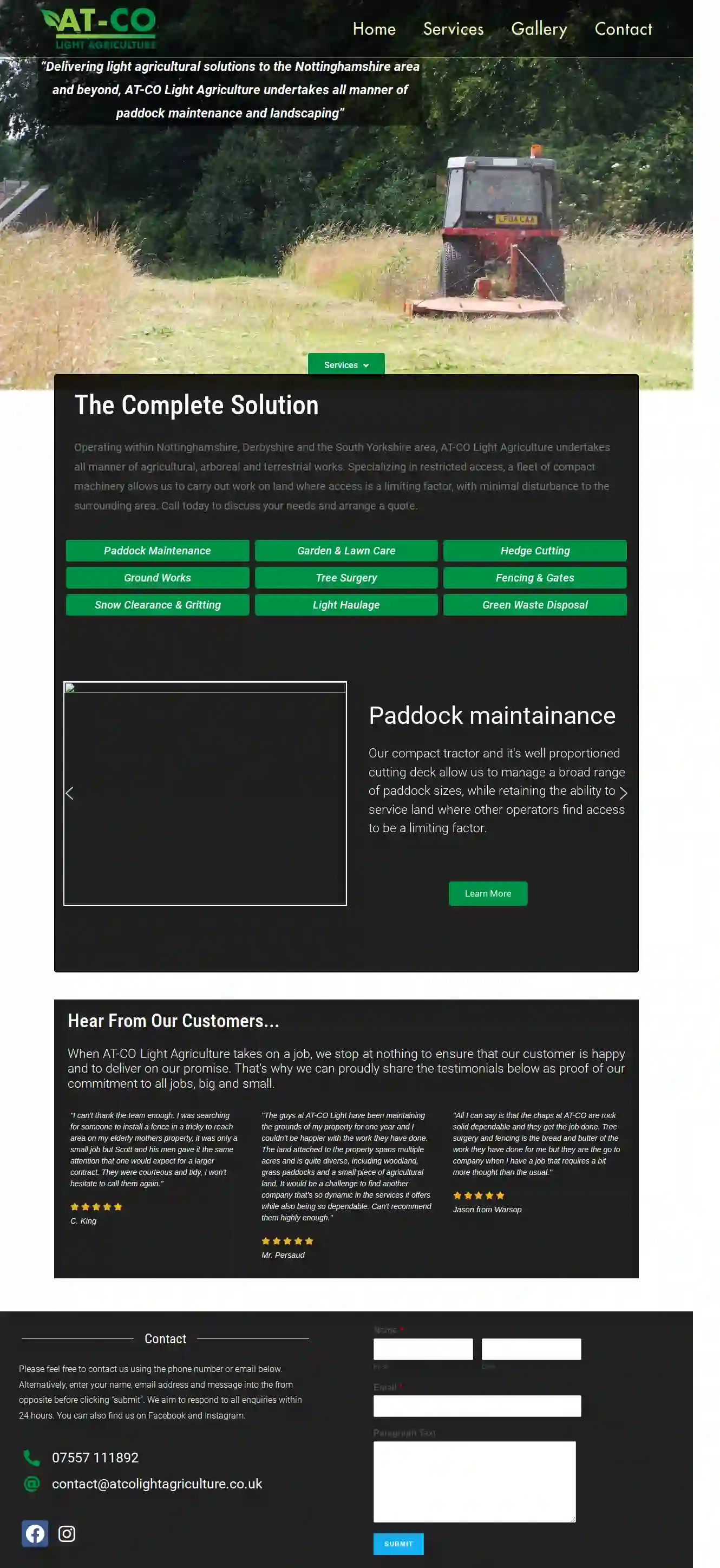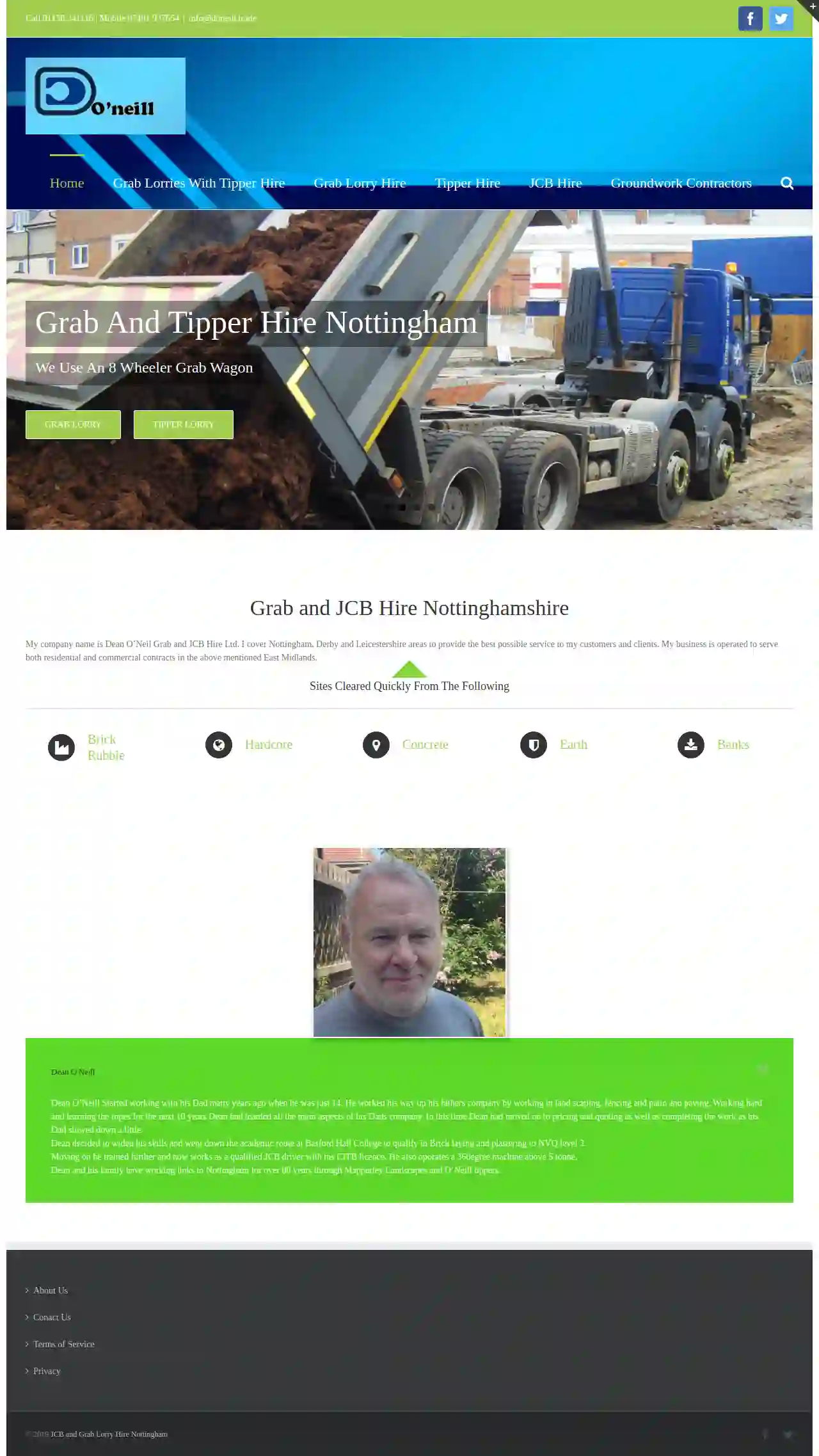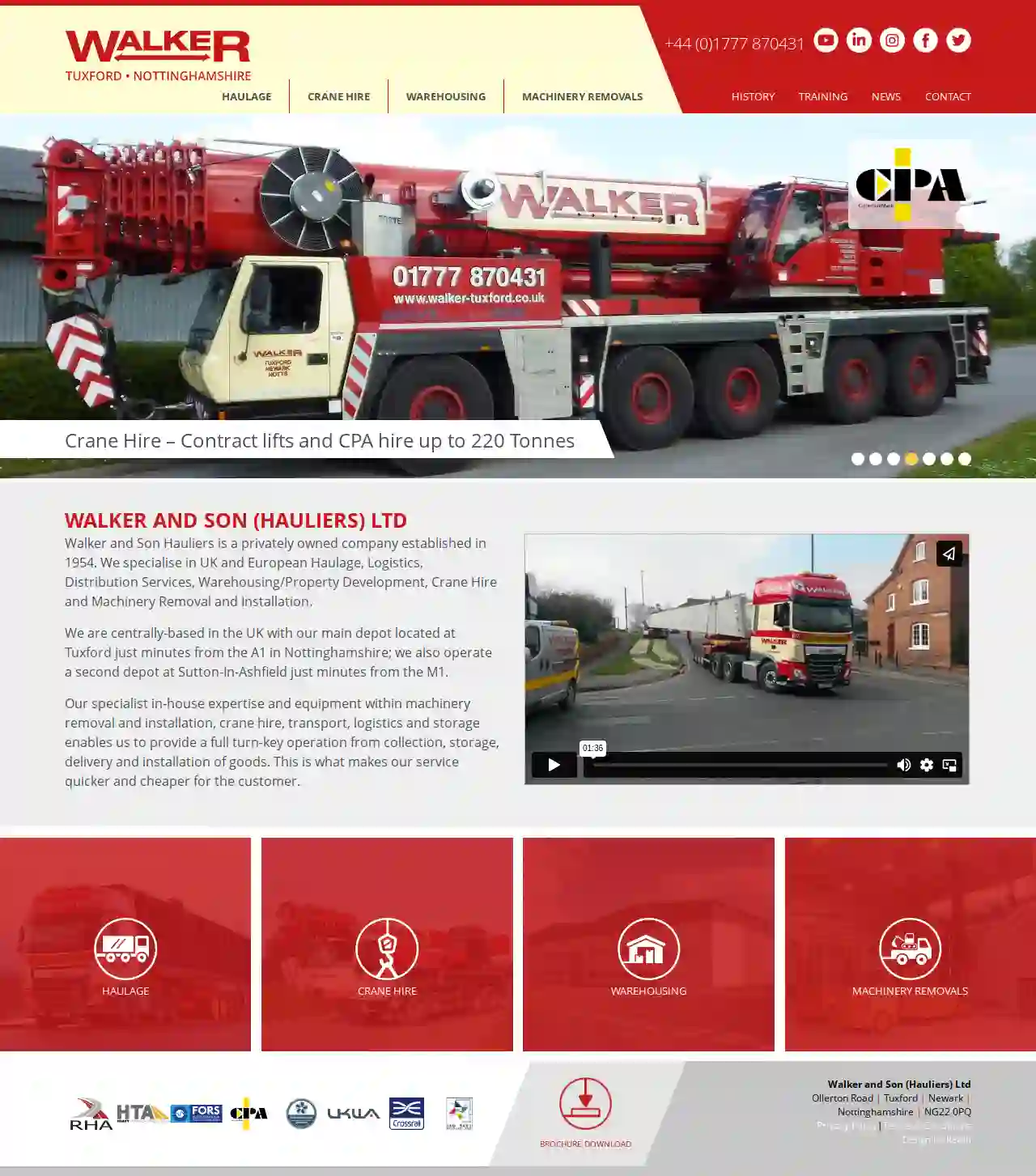Excavation Contractors Nottinghamshire
Find top Land Excavation in Nottinghamshire
Get 3 FREE Excavating Contractors quotes for your project today! Compare profiles, reviews, accreditations, portfolio, etc... and choose the best deal.
- Sc
Scureman Excavating
52 reviewsMansfield, GB- Services
- Why Us?
Get Quote 
AT-CO Light Agriculture
1Worksop, GBDelivering light agricultural solutions to the Nottinghamshire area and beyond, AT-CO Light Agriculture undertakes all manner of paddock maintenance and landscaping. Operating within Nottinghamshire, Derbyshire and the South Yorkshire area, AT-CO Light Agriculture undertakes all manner of agricultural, arboreal and terrestrial works. Specializing in restricted access, a fleet of compact machinery allows us to carry out work on land where access is a limiting factor, with minimal disturbance to the surrounding area. Call today to discuss your needs and arrange a quote.
- Services
- Why Us?
- Testimonials
- Gallery
Get Quote
Arnold Excavation Hire
3.73 reviewsAddress 1 Calstock Close, Penketh, Warrington., Address 1 Calstock ClosePenketh, Warrington, WA5 2NT, GBWelcome to Arnold Excavation We serve residential and commercial hires! Our machines provide a powerful yet convenient option for carrying out all kinds of small excavations, gardening projects, lifting and moving loads, both at home and on site. Why Choose Arnold Excavation Hire? Competitive rates Delivered and collected for your ease Delivered early on site, making sure the machines are there ready when you need them Long term discounted block bookings available One tank of fuel included in the price for all bookings Anyone can book our machines, from DIY users to trade professionals Our micro diggers have a width of 0.700m making them compact enough to fit through a standard doorway. This machine is perfect for garden renovations
- Services
- Why Us?
- Testimonials
- Gallery
Get Quote- Wl
Wlabs
4.416 reviewsWorksop, GB- Services
- Why Us?
Get Quote - Je
Jeremy huff excavation
4.517 reviewsMansfield, GB- Services
- Why Us?
Get Quote 
E P Industries Ltd
3.29 reviewsPye Bridge Ind Est, Main Road, Pye Bridge Ind Est | Main Road | Pye Bridge, Alfreton, DE55 4NX, GBEP Industries: Your Trusted Partner for Rail & Construction Plant EP Industries is a leading provider of services and products to the rail, construction, recycling, and mining industries. Established in 1988 by Eddie Pilsworth, we've built a strong reputation for quality workmanship, personalized service, and quick response times. Our dedicated team has years of experience maintaining mobile plant, from single machines to large fleet operations, ensuring we can meet your needs, both nationally and internationally. Our expertise extends beyond traditional services. We've gained valuable experience operating mobile equipment in open pit, coal mining, quarrying, and other extractive industries, allowing us to offer a unique perspective and tailored solutions to mobile plant users. At EP Industries, we prioritize building long-term relationships with our customers, ensuring our services are always aligned with your specific requirements.
- Services
- Why Us?
- Gallery
Get Quote- AA
AAA West Excavating, Inc.
52 reviewsMansfield, GB- Services
- Why Us?
Get Quote 
Dean O'Neill Grab and JCB Hire - Nottingham & Mansfield
53 reviewsMansfield, GBAbout Us My company name is Dean O’Neil Grab and JCB Hire Ltd. I cover Nottingham, Derby and Leicestershire areas to provide the best possible service to my customers and clients. My business is operated to serve both residential and commercial contracts in the above mentioned East Midlands. Dean O’Neill Started working with his Dad many years ago when he was just 14. He worked his way up his fathers company by working in land scaping, fencing and patio and paving. Working hard and learning the ropes for the next 10 years Dean had learded all the main aspects of his Dads company. In this time Dean had moved on to pricing and quoting as well as completing the work as his Dad slowed down a little. Dean decided to widen his skills and went down the academic route at Basford Hall College to qualify in Brick laying and plastering to NVQ level 3. Moving on he trained further and now works as a qualified JCB driver with his CITB licence. He also oporates a 360egree machine above 5 tonne. Dean and his family have working links to Nottingham for over 80 years through Mapperley Landscapes and O’Neill tippers.
- Services
- Why Us?
- Our Team
- Gallery
Get Quote
Walker & Son (Hauliers) Ltd
4.68 reviewsOllerton Road, Tuxford, NG22 0PQ, GBWalker and Son (Hauliers) Ltd Walker and Son Hauliers is a privately owned company established in 1954. We specialize in UK and European Haulage, Logistics, Distribution Services, Warehousing/Property Development, Crane Hire and Machinery Removal and Installation. We are centrally-based in the UK with our main depot located at Tuxford just minutes from the A1 in Nottinghamshire; we also operate a second depot at Sutton-In-Ashfield just minutes from the M1. Our specialist in-house expertise and equipment within machinery removal and installation, crane hire, transport, logistics and storage enables us to provide a full turn-key operation from collection, storage, delivery and installation of goods. This is what makes our service quicker and cheaper for the customer. Haulage Crane Hire Warehousing Machinery Removals
- Services
- Why Us?
- Gallery
Get Quote- An
Anchor Piling
1Mansfield, GB- Services
- Why Us?
Get Quote
Over 11,537+ Excavation Pros onboarded
Our excavation contractors operate in Nottinghamshire & beyond!
ExcavationHQ has curated and vetted the Best Excavation Contractors in and around Nottinghamshire. Find a trustworthy pro today.
Frequently Asked Questions About Excavation Contractors
- Clear the Area: Remove any obstacles, including vehicles, outdoor furniture, landscaping features, or structures, from the excavation zone and surrounding area.
- Mark Existing Features: Identify and mark underground utilities, septic tanks, sprinkler systems, or other buried elements you want to protect.
- Protect Landscaping: Use tarps or fencing to shield trees, shrubs, gardens, or other landscaping elements from damage.
- Provide Access: Ensure the excavation contractor has clear access to the work area, including gates wide enough for equipment.
- Discuss Logistics: Coordinate with the contractor regarding parking arrangements, material delivery, and any special instructions or concerns you might have.
- Planning and Surveying: Defining the excavation area, marking utility lines, and determining the required depth and grade.
- Site Preparation: Clearing vegetation, removing obstacles, and ensuring site accessibility.
- Excavation: Using appropriate equipment (excavators, backhoes, etc.) to remove earth and create the desired excavation.
- Hauling and Disposal: Transporting excavated material to designated disposal sites, complying with environmental regulations.
- Backfilling and Compaction: Refilling the excavation with suitable material and compacting it to achieve the required density and stability.
- Grading and Finishing: Leveling and shaping the surface to the final grade for landscaping or construction.
- Determine the Area: Measure the length and width of the area you want to fill. Multiply them to get the area in square feet (or meters).
- Determine the Depth: Measure the difference between the existing grade and the desired grade (how much you need to raise the ground). This is the depth of fill required.
- Calculate Volume: Multiply the area (step 1) by the depth (step 2) to get the volume in cubic feet (or meters).
- Account for Compaction: Fill dirt compacts when it settles, so add 10% to 25% to the calculated volume to account for compaction. The exact percentage depends on the type of fill material.
- Basement Size: The larger the basement, the more excavation is required, increasing the cost.
- Soil Type: Excavating rocky or dense clay soil is generally more expensive than loose soil.
- Accessibility: Difficult-to-access sites might require specialized equipment or more labor, driving up costs.
- Foundation Type: The chosen foundation type (full basement, crawl space, slab) affects excavation needs.
- Underpinning: If underpinning (strengthening existing foundations) is necessary, it significantly increases costs.
- Disposal Fees: Hauling excavated soil to disposal sites adds to the overall expense.
How do I prepare my property for excavation?
What is the excavation process?
How do I calculate how much dirt I need for fill?
How much does it cost to excavate a basement?
How do I prepare my property for excavation?
- Clear the Area: Remove any obstacles, including vehicles, outdoor furniture, landscaping features, or structures, from the excavation zone and surrounding area.
- Mark Existing Features: Identify and mark underground utilities, septic tanks, sprinkler systems, or other buried elements you want to protect.
- Protect Landscaping: Use tarps or fencing to shield trees, shrubs, gardens, or other landscaping elements from damage.
- Provide Access: Ensure the excavation contractor has clear access to the work area, including gates wide enough for equipment.
- Discuss Logistics: Coordinate with the contractor regarding parking arrangements, material delivery, and any special instructions or concerns you might have.
What is the excavation process?
- Planning and Surveying: Defining the excavation area, marking utility lines, and determining the required depth and grade.
- Site Preparation: Clearing vegetation, removing obstacles, and ensuring site accessibility.
- Excavation: Using appropriate equipment (excavators, backhoes, etc.) to remove earth and create the desired excavation.
- Hauling and Disposal: Transporting excavated material to designated disposal sites, complying with environmental regulations.
- Backfilling and Compaction: Refilling the excavation with suitable material and compacting it to achieve the required density and stability.
- Grading and Finishing: Leveling and shaping the surface to the final grade for landscaping or construction.
How do I calculate how much dirt I need for fill?
- Determine the Area: Measure the length and width of the area you want to fill. Multiply them to get the area in square feet (or meters).
- Determine the Depth: Measure the difference between the existing grade and the desired grade (how much you need to raise the ground). This is the depth of fill required.
- Calculate Volume: Multiply the area (step 1) by the depth (step 2) to get the volume in cubic feet (or meters).
- Account for Compaction: Fill dirt compacts when it settles, so add 10% to 25% to the calculated volume to account for compaction. The exact percentage depends on the type of fill material.
How much does it cost to excavate a basement?
- Basement Size: The larger the basement, the more excavation is required, increasing the cost.
- Soil Type: Excavating rocky or dense clay soil is generally more expensive than loose soil.
- Accessibility: Difficult-to-access sites might require specialized equipment or more labor, driving up costs.
- Foundation Type: The chosen foundation type (full basement, crawl space, slab) affects excavation needs.
- Underpinning: If underpinning (strengthening existing foundations) is necessary, it significantly increases costs.
- Disposal Fees: Hauling excavated soil to disposal sites adds to the overall expense.